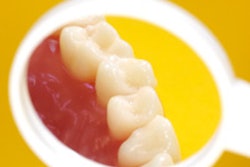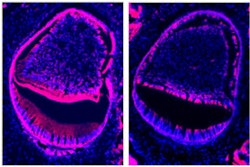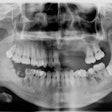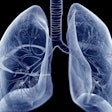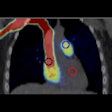Researchers at the University of California, Los Angeles (UCLA) School of Dentistry, working with scientists at the University of Michigan and the University of California, San Diego, have identified a potential new focus of treatments for osteoporosis, periodontitis, and similar diseases: a master protein that controls genes associated with inflammation and immunity.
In a paper published May 17 in the online edition of the journal Nature Medicine, Cun-Yu Wang, D.D.S., Ph.D., chair of the UCLA dental school's division of oral biology and medicine, and colleagues suggest that inhibiting nuclear factor-kB (NF-kB) can prevent disabling bone loss by maintaining bone formation.
The NF-kB protein, a culprit in inflammatory and immune disorders, plays a major role in both osteoporosis and periodontitis, disrupting the healthy balance of bone destruction and formation. It is this balance that Dr. Wang and his fellow scientists seek to restore, and perhaps even improve upon, by finding new ways to promote net bone accumulation.
"Most studies focus on the part that NF-kB plays in the regulation of osteoclasts. For the past five years, we looked closely at the effect of NF-kB on osteoblasts," Dr. Wang said. "We knew that NF-kB promoted resorption. What we discovered in our in vitro and in vivo studies is that this protein also inhibits new bone formation, giving us a fuller picture of its role in inflammation and immune responses."
"This landmark paper by Dr. Wang and his colleagues is not only top-notch molecular science, but it also holds promise for clinicians trying to provide the most enlightened treatment of women with postmenopausal osteoporosis," said John Adams, a UCLA professor of orthopedic surgery. "The paper shows how the molecular manipulation of a previously unsuspected proinflammatory pathway in the bone-forming cell, the osteoblast, can regulate the capacity of that cell to make new bone."
Many currently available treatments work to prevent further bone loss but are not able to increase bone mass. Dr. Wang's research results support the idea that a new drug that prevents the action of NF-kB in cells may represent a major therapeutic advance.
"Although it has been known for some time that inflammation inhibits bone formation, the groundbreaking work by Dr. Wang and his colleagues elucidates the critical role of NF-kB in the mechanism that underlies this phenomenon," said Philip Stashenko, D.M.D., Ph.D., a professor at the Harvard School of Dental Medicine and president and CEO of the Forsyth Institute. "Many drugs that block NF-kB are in development, and these findings suggest that new treatments to preserve bone in periodontitis, osteoporosis, and related bone diseases are imminent."
Copyright © 2009 DrBicuspid.com




